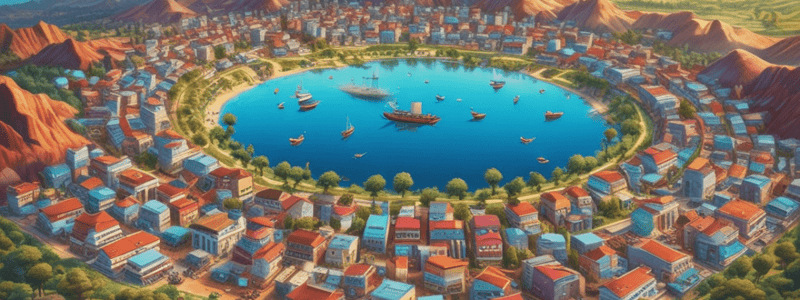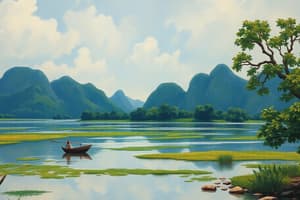Podcast
Questions and Answers
Why did the author feel like the only person following hockey when he moved to Charlotte, North Carolina?
Why did the author feel like the only person following hockey when he moved to Charlotte, North Carolina?
- Hockey isn't a big deal in the Southern region. (correct)
- Charlotte, North Carolina has more basketball fans.
- The climate in Charlotte is not suitable for playing hockey.
- The author didn't have access to hockey games in Charlotte.
What role do geography and climate play in affecting culture, based on the text?
What role do geography and climate play in affecting culture, based on the text?
- They significantly affect cultural differences. (correct)
- They have no impact on culture.
- They determine the popularity of sports.
- They influence the types of occupations people have.
Why do civilizations tend to arise in regions that are habitable and capable of sustaining life?
Why do civilizations tend to arise in regions that are habitable and capable of sustaining life?
- To enable human beings to practice settled agriculture and pastoralization. (correct)
- As a result of the high population density in those areas.
- Because of the abundance of technology in those regions.
- Due to the presence of advanced social structures.
Which factor contributes to the bigger following of hockey in the North compared to the South?
Which factor contributes to the bigger following of hockey in the North compared to the South?
How do geographical differences between regions like the West Coast and St. Louis affect cultural practices?
How do geographical differences between regions like the West Coast and St. Louis affect cultural practices?
What was a major outcome of the Neolithic Revolution mentioned in the text?
What was a major outcome of the Neolithic Revolution mentioned in the text?
According to the passage, which of the following factors was crucial for the emergence of early civilizations?
According to the passage, which of the following factors was crucial for the emergence of early civilizations?
What was the primary reason for the ancient Egyptians' reverence for the Nile River?
What was the primary reason for the ancient Egyptians' reverence for the Nile River?
Which of the following statements about the Incas' Machu Picchu settlement is true, according to the passage?
Which of the following statements about the Incas' Machu Picchu settlement is true, according to the passage?
Which of the following best describes the relationship between civilizations and their surrounding geography, as discussed in the passage?
Which of the following best describes the relationship between civilizations and their surrounding geography, as discussed in the passage?
According to the passage, which of the following resources was essential for the rise of the Hittite civilization?
According to the passage, which of the following resources was essential for the rise of the Hittite civilization?
Which of the following statements best represents the central idea of the passage?
Which of the following statements best represents the central idea of the passage?
According to the passage, which of the following civilizations was known for its wealth derived from gold?
According to the passage, which of the following civilizations was known for its wealth derived from gold?
Which of the following statements is NOT supported by the information provided in the passage?
Which of the following statements is NOT supported by the information provided in the passage?
What is a common trait among the early civilizations mentioned in the passage?
What is a common trait among the early civilizations mentioned in the passage?
How did the ancient Egyptians' religious beliefs reflect their geographical surroundings?
How did the ancient Egyptians' religious beliefs reflect their geographical surroundings?
Which natural resource was crucial for the Hittite civilization's expansion of power?
Which natural resource was crucial for the Hittite civilization's expansion of power?
How did technological advancements enable civilizations to adapt to challenging terrains?
How did technological advancements enable civilizations to adapt to challenging terrains?
Which factor was NOT mentioned as influencing the location of early civilizations?
Which factor was NOT mentioned as influencing the location of early civilizations?
What natural feature played a central role in shaping the lives of the Inuit tribes?
What natural feature played a central role in shaping the lives of the Inuit tribes?
Why is Mesopotamia referred to as the 'cradle of civilization'?
Why is Mesopotamia referred to as the 'cradle of civilization'?
What distinguished Germany's rise to power from Spain's wealth accumulation from gold?
What distinguished Germany's rise to power from Spain's wealth accumulation from gold?
Why did the author notice a difference in the popularity of hockey when moving from Michigan to North Carolina?
Why did the author notice a difference in the popularity of hockey when moving from Michigan to North Carolina?
What effect does the passage suggest climate has on the popularity of certain sports?
What effect does the passage suggest climate has on the popularity of certain sports?
In which scenario is geography NOT directly influencing cultural practices based on the passage?
In which scenario is geography NOT directly influencing cultural practices based on the passage?
How does the text explain the different lifestyles of a farmer in Iowa and a banker on Wall Street?
How does the text explain the different lifestyles of a farmer in Iowa and a banker on Wall Street?
Which best describes the primary reason why civilizations tend to develop in certain regions according to the text?
Which best describes the primary reason why civilizations tend to develop in certain regions according to the text?
Based on the text, what role do geography and climate play in influencing cultural preferences?
Based on the text, what role do geography and climate play in influencing cultural preferences?
How do differing geographical locations contribute to the distinct lifestyles experienced by people across regions?
How do differing geographical locations contribute to the distinct lifestyles experienced by people across regions?
Flashcards are hidden until you start studying
Study Notes
Early Civilizations
- Early civilizations arose in regions with inhabitable and sustainable conditions, such as fertile land and access to resources.
- The Neolithic Revolution marked the shift from hunting and gathering to settled agriculture and pastoralization, leading to the establishment of civilizations.
- Many early civilizations, such as the Sumerians, Egyptians, Harappa, and Chavin, emerged along rivers in fertile land, including the Tigris and Euphrates, Nile, Indus, and Mosna rivers.
Natural Resources
- Access to natural resources, such as iron ore, copper, and gold, played a significant role in the development of civilizations.
- Examples include the Hittite civilization, which relied on iron ore, and Spain's growth in the 15th-17th centuries due to gold stolen from Mayan and Incan tribes.
- Areas with abundant hunting game also attracted early settlements.
Geographical and Cultural Adaptations
- Civilizations adapted to their specific geography and climate, often developing unique cultural practices and technologies.
- Examples include the ancient Egyptians, who aligned their agricultural practices with the Nile River's seasonal flooding, and the Inuit tribes, who adapted to the Arctic climate.
- In time, civilizations developed technologies to overcome geographical limitations, such as the Incas' Machu Picchu settlement in the Andes Mountains.
Cultural Differences
- Geography and climate have a significant impact on cultural differences, shaping the way people live, work, and practice their beliefs.
- Examples include the popularity of hockey in the North versus the South, and the difference in lifestyle between farmers in Iowa and bankers in New York City.
Studying That Suits You
Use AI to generate personalized quizzes and flashcards to suit your learning preferences.





